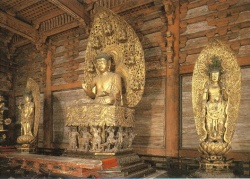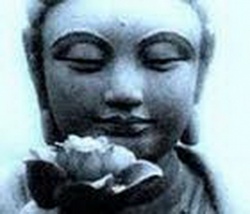Difference between revisions of "The ten principal disciples"
(Created page with "thumb|250px| <poem> The ten principal disciples were the main disciples of Shakyamuni Buddha. Depending on the scripture, the disciples included in this g...") |
m (Text replace - "result" to "result") |
||
| (One intermediate revision by one other user not shown) | |||
| Line 1: | Line 1: | ||
[[File:M-bud10.jpg|thumb|250px|]] | [[File:M-bud10.jpg|thumb|250px|]] | ||
<poem> | <poem> | ||
| − | The ten principal disciples were the main disciples of Shakyamuni Buddha. Depending on the scripture, the disciples included in this group vary. Vimalakirti Sutra includes; | + | The ten principal [[disciples]] were the main [[disciples]] of [[Shakyamuni Buddha]]. Depending on the [[scripture]], the [[disciples]] included in this group vary. [[Vimalakirti Sutra]] includes; |
| − | Śāriputra | + | [[Śāriputra]] |
| − | Śāriputra (Sanskrit), or Sāriputta (Pāli), is a top master of Wisdom. In Heart Sutra, Shakyamuni Buddha preaches to him. | + | [[Śāriputra]] ([[Sanskrit]]), or [[Sāriputta]] ([[Pāli]]), is a top [[master]] of [[Wisdom]]. In [[Heart Sutra]], [[Shakyamuni Buddha]] preaches to him. |
| − | Maudgalyayana | + | [[Maudgalyayana]] |
| − | Maudgalyāyana (Sk.) or Moggallāna(Pl.), also known as Mahāmaudgalyāyana or Mahāmoggallāna. He is a top master of supernatural powers. Maudgalyayana and Śāriputra were once disciples of Sañjaya Belaṭṭhaputta, the skeptic, but they became disciples of the Buddha. In Chinese Buddhism, the Mass that Maudgalyayana held to save his mother who had gone to the Hungry Ghost realm (one of the Six realms) is the foundation of ullambana (Ghost Festival). | + | [[Maudgalyāyana]] (Sk.) or Moggallāna(Pl.), also known as [[Mahāmaudgalyāyana]] or [[Mahāmoggallāna]]. He is a top [[master]] of [[supernatural powers]]. [[Maudgalyayana]] and [[Śāriputra]] were once [[disciples]] of [[Sañjaya]] Belaṭṭhaputta, the skeptic, but they became [[disciples]] of the [[Buddha]]. In [[Chinese Buddhism]], the Mass that [[Maudgalyayana]] held to save his mother who had gone to the [[Hungry Ghost]] [[realm]] (one of the [[Six realms]]) is the foundation of ullambana ([[Ghost]] Festival). |
| − | Mahākāśyapa | + | [[Mahākāśyapa]] |
| − | Mahākāśyapa (Sk.) or Mahākassapa (Pl.). He was a top master of ascetic training. After the death of Shakyamuni Buddha, he assumes the leadership of the sangha, compiled the Buddha's sayings (suttas) with 500 other disciples (First Buddhist councils), and became the first man who preached the Buddha's teachings directly. | + | [[Mahākāśyapa]] (Sk.) or [[Mahākassapa]] (Pl.). He was a top [[master]] of [[ascetic]] training. After the [[death]] of [[Shakyamuni Buddha]], he assumes the leadership of the [[sangha]], compiled the [[Buddha's]] sayings ([[suttas]]) with 500 other [[disciples]] (First [[Buddhist]] [[councils]]), and became the first man who preached the [[Buddha's teachings]] directly. |
| − | Subhuti | + | [[Subhuti]] |
| − | Subhūti (Sk. & Pl.) understood the potency of emptiness. He appears in several Sutras of Mahāyāna Buddhism which teach Śūnyatā (Emptiness or Voidness). | + | [[Subhūti]] (Sk. & Pl.) understood the potency of [[emptiness]]. He appears in several [[Sutras]] of [[Mahāyāna Buddhism]] which teach [[Śūnyatā]] ([[Emptiness]] or [[Voidness]]). |
| − | Purna Maitrayani-putra | + | [[Purna Maitrayani-putra]] |
| − | Pūrṇa Maitrāyaniputra (Sk.) or Puṇṇa Mantānīputta (Pl.). He was also called Purna for short. He was the greatest teacher of the Law out of all the disciples. He was the top master of preaching. | + | [[Pūrṇa]] Maitrāyaniputra (Sk.) or [[Puṇṇa]] Mantānīputta (Pl.). He was also called [[Purna]] for short. He was the greatest [[teacher]] of the Law out of all the [[disciples]]. He was the top [[master]] of preaching. |
| − | Katyayana | + | [[Katyayana]] |
[[File:Ima145ges.jpg|thumb|250px|]] | [[File:Ima145ges.jpg|thumb|250px|]] | ||
| − | Kātyāyana or Mahākātyāyana (Sk.) or Mahākaccāna (Pl.). He understood Shakyamuni Buddha's lecture the best. Although he had only five master in the rural areas, he was permitted to learn Vinaya by the Buddha. | + | [[Kātyāyana]] or [[Mahākātyāyana]] (Sk.) or [[Mahākaccāna]] (Pl.). He understood [[Shakyamuni]] [[Buddha's]] lecture the best. Although he had only five [[master]] in the rural areas, he was permitted to learn [[Vinaya]] by the [[Buddha]]. |
| − | Aniruddha | + | [[Aniruddha]] |
| − | Aniruddha (Sk.) or Anuruddha (Pl.) was a top master of clairvoyance. Aniruddha was a cousin of Shakyamuni Buddha. He and Ananda became monks at the same time. He once slept in front of the Buddha, so he was rebuked by the Buddha sharply. He swore an oath that he would never sleep again. Although he lost his sight as a result, he got another pair of eyes that could see the truth. | + | [[Aniruddha]] (Sk.) or [[Anuruddha]] (Pl.) was a top [[master]] of clairvoyance. [[Aniruddha]] was a cousin of [[Shakyamuni Buddha]]. He and [[Ananda]] became [[monks]] at the same [[time]]. He once slept in front of the [[Buddha]], so he was rebuked by the [[Buddha]] sharply. He swore an oath that he would never [[sleep]] again. Although he lost his [[sight]] as a result, he got another pair of [[eyes]] that could see the [[truth]]. |
| − | Upali | + | [[Upali]] |
| − | Upāli (Sk. & Pl.) was a top master of Vinaya. He was born in the Shudra class and worked as a barber. Buddha had denied the class system, he ranked his disciples according to the order in which they joined. So Upali was ranked ahead of the ex-princes. In the First Buddhist council, the Vinaya was compiled based on his memory. | + | [[Upāli]] (Sk. & Pl.) was a top [[master]] of [[Vinaya]]. He was born in the [[Shudra]] class and worked as a barber. [[Buddha]] had denied the class system, he ranked his [[disciples]] according to the [[order]] in which they joined. So [[Upali]] was ranked ahead of the ex-princes. In the [[First Buddhist council]], the [[Vinaya]] was compiled based on his [[memory]]. |
| − | Rāhula | + | [[Rāhula]] |
| − | Rāhula (Sk. & Pl.) was the only son of the Buddha (when he was still Prince Siddartha) and his wife Princess Yasodhara. He as a scrupulous, strict and shrewd person. When the Buddha went to his hometown, he became the first Sāmanera (novice monk). | + | [[Rāhula]] (Sk. & Pl.) was the only son of the [[Buddha]] (when he was still {{Wiki|Prince}} [[Siddartha]]) and his wife {{Wiki|Princess}} Yasodhara. He as a scrupulous, strict and shrewd [[person]]. When the [[Buddha]] went to his hometown, he became the first Sāmanera ([[novice]] [[monk]]). |
| − | Ananda | + | [[Ananda]] |
| − | Ānanda (Sk. & Pl.) listened to the Buddha's teachings the most among the disciples. He was a cousin of the Buddha. Ananda means great delight. After he became a monk, he took care of the Buddha for 25 years, until the Buddha died. In the First Buddhist council, the Vinaya was compiled based on his memory. He lived to 120 years old. | + | [[Ānanda]] (Sk. & Pl.) listened to the [[Buddha's teachings]] the most among the [[disciples]]. He was a cousin of the [[Buddha]]. [[Ananda]] means great [[delight]]. After he became a [[monk]], he took care of the [[Buddha]] for 25 years, until the [[Buddha]] [[died]]. In the [[First Buddhist council]], the [[Vinaya]] was compiled based on his [[memory]]. He lived to 120 years old. |
</poem> | </poem> | ||
{{W}} | {{W}} | ||
[[Category:Buddhist Terms]] | [[Category:Buddhist Terms]] | ||
[[Category:Disciples of Buddha Shakyamuni]] | [[Category:Disciples of Buddha Shakyamuni]] | ||
Latest revision as of 09:30, 5 September 2013
The ten principal disciples were the main disciples of Shakyamuni Buddha. Depending on the scripture, the disciples included in this group vary. Vimalakirti Sutra includes;
Śāriputra
Śāriputra (Sanskrit), or Sāriputta (Pāli), is a top master of Wisdom. In Heart Sutra, Shakyamuni Buddha preaches to him.
Maudgalyayana
Maudgalyāyana (Sk.) or Moggallāna(Pl.), also known as Mahāmaudgalyāyana or Mahāmoggallāna. He is a top master of supernatural powers. Maudgalyayana and Śāriputra were once disciples of Sañjaya Belaṭṭhaputta, the skeptic, but they became disciples of the Buddha. In Chinese Buddhism, the Mass that Maudgalyayana held to save his mother who had gone to the Hungry Ghost realm (one of the Six realms) is the foundation of ullambana (Ghost Festival).
Mahākāśyapa
Mahākāśyapa (Sk.) or Mahākassapa (Pl.). He was a top master of ascetic training. After the death of Shakyamuni Buddha, he assumes the leadership of the sangha, compiled the Buddha's sayings (suttas) with 500 other disciples (First Buddhist councils), and became the first man who preached the Buddha's teachings directly.
Subhuti
Subhūti (Sk. & Pl.) understood the potency of emptiness. He appears in several Sutras of Mahāyāna Buddhism which teach Śūnyatā (Emptiness or Voidness).
Purna Maitrayani-putra
Pūrṇa Maitrāyaniputra (Sk.) or Puṇṇa Mantānīputta (Pl.). He was also called Purna for short. He was the greatest teacher of the Law out of all the disciples. He was the top master of preaching.
Katyayana
Kātyāyana or Mahākātyāyana (Sk.) or Mahākaccāna (Pl.). He understood Shakyamuni Buddha's lecture the best. Although he had only five master in the rural areas, he was permitted to learn Vinaya by the Buddha.
Aniruddha
Aniruddha (Sk.) or Anuruddha (Pl.) was a top master of clairvoyance. Aniruddha was a cousin of Shakyamuni Buddha. He and Ananda became monks at the same time. He once slept in front of the Buddha, so he was rebuked by the Buddha sharply. He swore an oath that he would never sleep again. Although he lost his sight as a result, he got another pair of eyes that could see the truth.
Upali
Upāli (Sk. & Pl.) was a top master of Vinaya. He was born in the Shudra class and worked as a barber. Buddha had denied the class system, he ranked his disciples according to the order in which they joined. So Upali was ranked ahead of the ex-princes. In the First Buddhist council, the Vinaya was compiled based on his memory.
Rāhula
Rāhula (Sk. & Pl.) was the only son of the Buddha (when he was still Prince Siddartha) and his wife Princess Yasodhara. He as a scrupulous, strict and shrewd person. When the Buddha went to his hometown, he became the first Sāmanera (novice monk).
Ananda
Ānanda (Sk. & Pl.) listened to the Buddha's teachings the most among the disciples. He was a cousin of the Buddha. Ananda means great delight. After he became a monk, he took care of the Buddha for 25 years, until the Buddha died. In the First Buddhist council, the Vinaya was compiled based on his memory. He lived to 120 years old.

